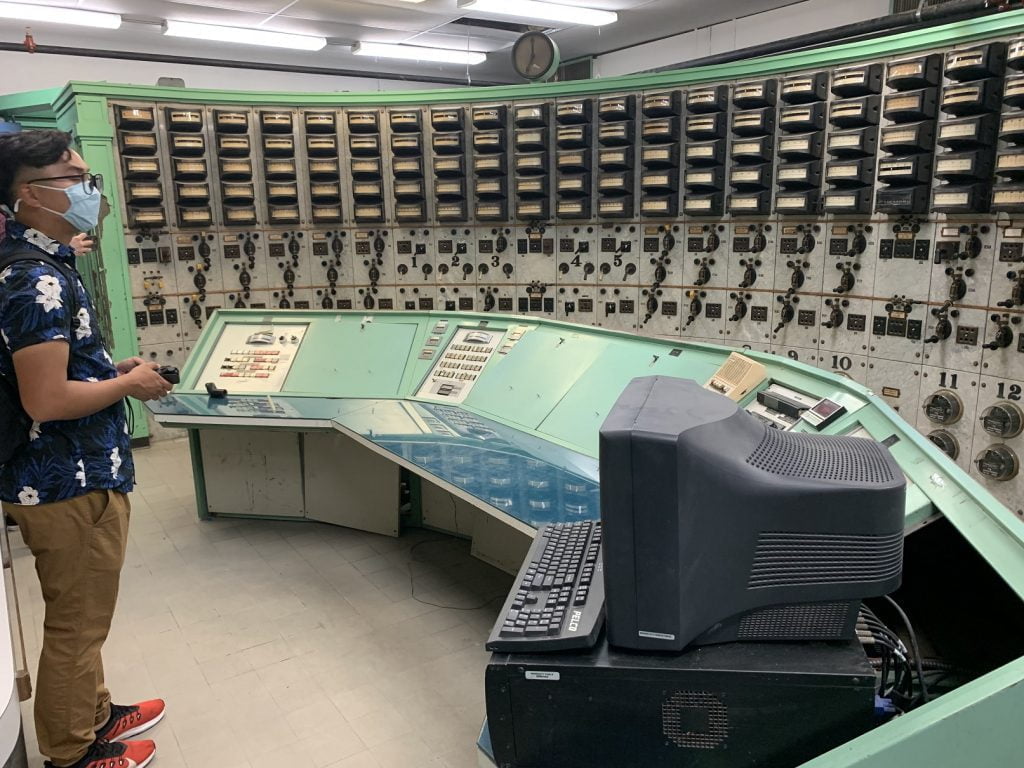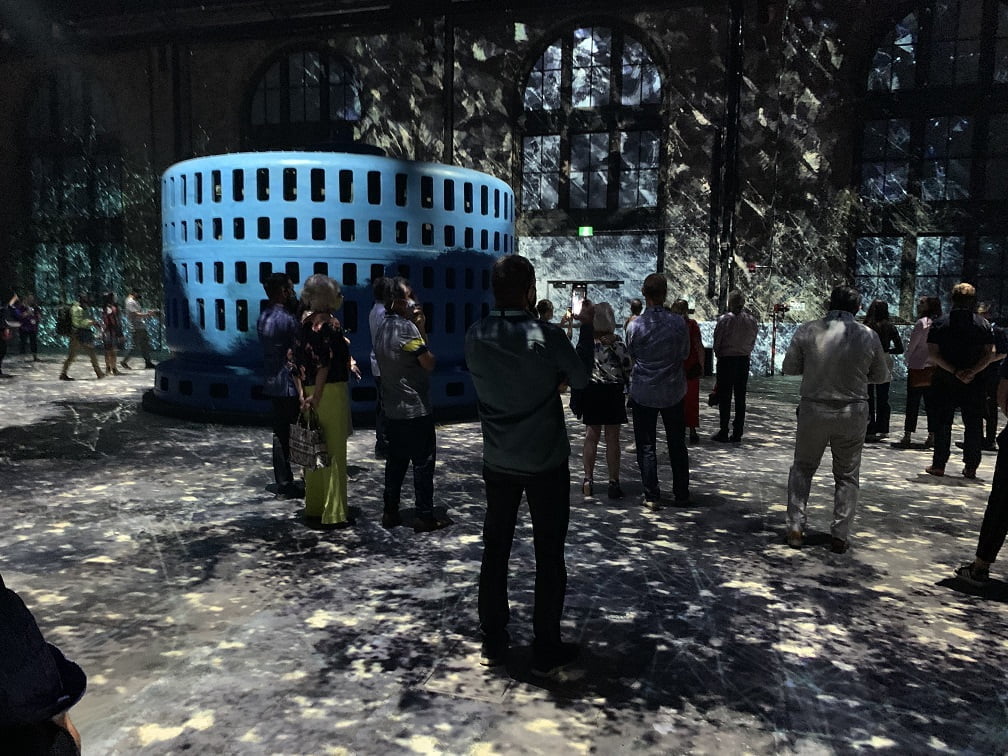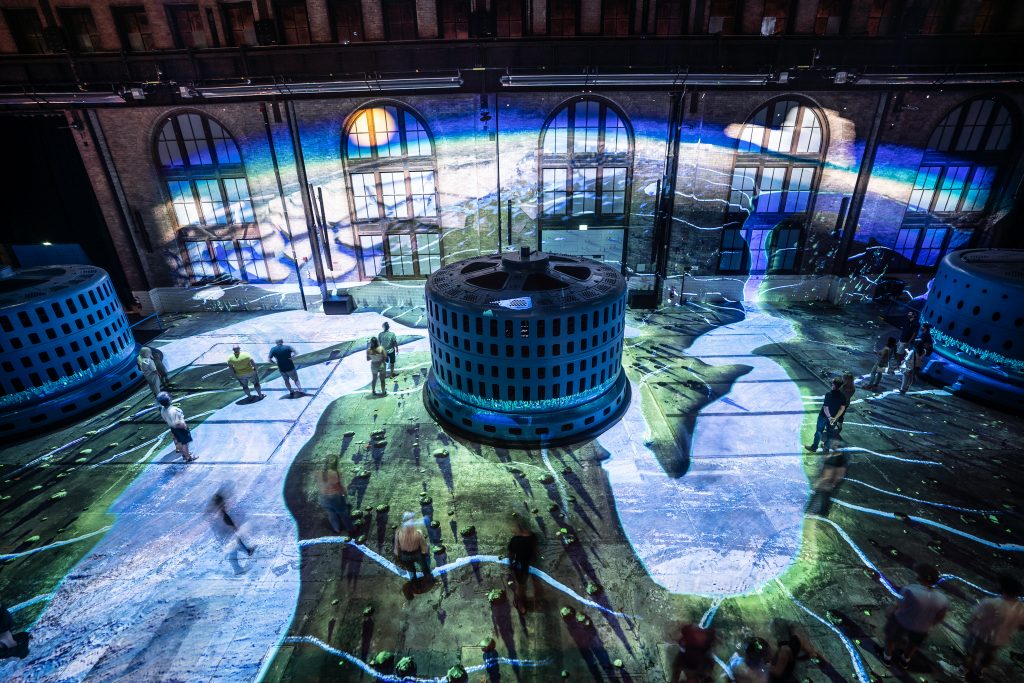
“Currents: Niagara’s Power Transformed” is a 40-minute projection-mapped light show that tells the story of the Niagara Park Power Station and the history of electricity in the region. (Photo courtesy of Niagara Parks)
The best part of my visit to the Niagara Parks Power Station was watching my wife slowly discover her inner engineer.
She was keen to hop in a car and drive with me to Niagara Falls after a long travel hiatus due to COVID-19 but didn’t understand why I would think visiting a refurbished power station would be of any interest to her. She isn’t mechanically inclined, has no interest in dusty industrial buildings, and like most people only cares about electricity when a light bulb blows.
Nevertheless, sometimes you have to see the beauty of a thing for yourself before you can truly appreciate what it has to offer. At least that’s the argument I used to get her to quit griping and get into the car.

A scale model of the Niagara Power Station gives visitors an idea of the layout and size of the facility. It is a great spot for visitors to get an idea of the sheer size of the building and demonstrate how the Niagara River was used to generate electricity. (Rod Charles photo for Vacay.ca)
For 100 years, the “Canadian Niagara Power Company generating station” exploited the powerful energy of Horseshoe Falls and turned it into a great source of electricity. Hydroelectric power is a renewable energy source that harnesses the power of moving water to produce electricity. Large-scale hydroelectricity projects typically involve dams, tidal projects, or run-of-river installations such as the Niagara Power Plant.
One of the great Canadian engineering marvels of its time, the Niagara Parks Power Station was a historic achievement in engineering and architecture, remaining operational until 2006.

Horseshoe Falls is directly in front of the Niagara Parks Power Station (upper right). Water from Niagara Falls was drawn from the Niagara River into the station to create electricity. (Photo courtesy of Niagara Parks)
Constructed in 1905, the Niagara Parks Power Station has suddenly become the area’s newest attraction. The plant has rejuvenated with entertaining and educational family experiences and exhibits. This includes a scale model of the station, showcasing the sheer size and layout of the building and illustrating how fast-moving water was pulled in from the river into turbines 180 feet (55 metres) below to generate electricity. When my wife was able to visualize this awesome achievement of power, through a display that compares the giant blue generators on the power station floor to the tiny blue replicas on the model, I saw the lights go on, pardon the pun.
“My goodness, this is interesting. I never would have known,” she said. It was in that moment I knew our trip was going to be a joyful one.

Visitors to the Niagara Parks Power Station have a chance to walk through and see intricate, if dated, technology in the control room. All of the operations were managed from this room. (Rod Charles photo for Vacay.ca)
Apparently, we aren’t the only people impressed by the engineering at the plant. Niagara Parks CEO David Adames says the Niagara Parks Power Station has received a strong response so far, especially from local residents and tourists.
“A recurring comment we hear from visitors is how often they’ve passed by the power station and how excited they are to finally be able to see inside the building,” Adames said. “We have continued to see a rise in visitation at the site during the early fall season, when our attendance numbers would usually be dropping off, which speaks to the strong response we have seen to the launch of ‘Currents: Niagara’s Power Transformed.’ Many of our guests have shared how well the day and night experiences complement each other and I encourage everyone to take in both when they visit us this fall.”
It’s one thing to hear someone talk about jaw-dropping engineering and history but it’s another thing to see it for yourself. As we took in the sheer size of the plant, my wife asked more questions while I bulked up my ego by pretending to know the answers. I love attractions that educate, inspire, and leave you a little smarter — especially in front of your better half — when the visit is over. The Niagara Parks Power Station is certainly that type of attraction.

Giant blue generators bounce to life at the “Currents: Niagara’s Power Transformed” light show. The presentation was created by renowned Montreal-based design and production firm Thinkwell Group. (Rod Charles photo for Vacay.ca)
Officially opened to the public earlier this year, the Niagara Parks Power Station is a 65,000-square-foot behemoth of a building that during its peak handled 9,500 cubic feet of water per second. Employing around 70 people at a time at the height of its operation, the facility is considered to be the only fully intact decommissioned hydroelectric power plant of its era in the world.
The daytime guest experience features interactive exhibits and interpretative installations that explore the history and science of hydroelectric power generation. Repurposed artifacts, interactive exhibits, and interpretative installations offer a first-hand look at how this hydropower pioneer harnessed water to generate electricity for 100 years.
During our visit we were able to walk through the control room and a pipe-tunnel that illustrated the volume of water that the facility could handle.

Visitors to the Niagara Parks Power Station can walk through a massive pipe that water used to flow into. The exhibit gives tourists an idea of the amount of water that was moved by the plant. (Rod Charles photo for Vacay.ca)
The daytime experience is impressive but the nighttime immersive multimedia experience “Currents: Niagara’s Power Transformed” is what most visitors will want to see. Created by Montreal-based design and production firm Thinkwell Group, “Currents” brings the dormant station back to life with state-of-the-art sound and 3D projection-mapping technology. Thinkwell uses more than 40 minutes of projection-mapped content and lighting design to tell the story of and celebrate the station’s rich history and architectural features. The century-old facility turns into a canvas as the story of the transformation of water to electricity is told.

The immersive experience at the Niagara Parks Power Station uses the facility as a canvas for artistic storytelling. (Photo courtesy of Niagara Parks)
The sensory experience used imagery, colour, lights, sound, and music. Let’s face it, the Falls will always be the number one attraction in the Niagara Region. But even if you aren’t mechanically inclined, have no interest in dusty industrial buildings, and only care about electricity when a light bulb pops you will find your inner engineer at the Niagara Parks Power Station.
MORE ABOUT NIAGARA PARKS POWER STATION
Website: www.niagaraparks.com/visit/attractions/niagara-parks-power-station
Admission:
Regular $20 / $13
Admission and Guided Tour $37 / $24
Currents Night Show $30 / $19.50
Address: 7005 Niagara Parkway, Ontario
Phone: 1 (877) 642-7275
Niagara Parks Website: www.niagaraparks.com







